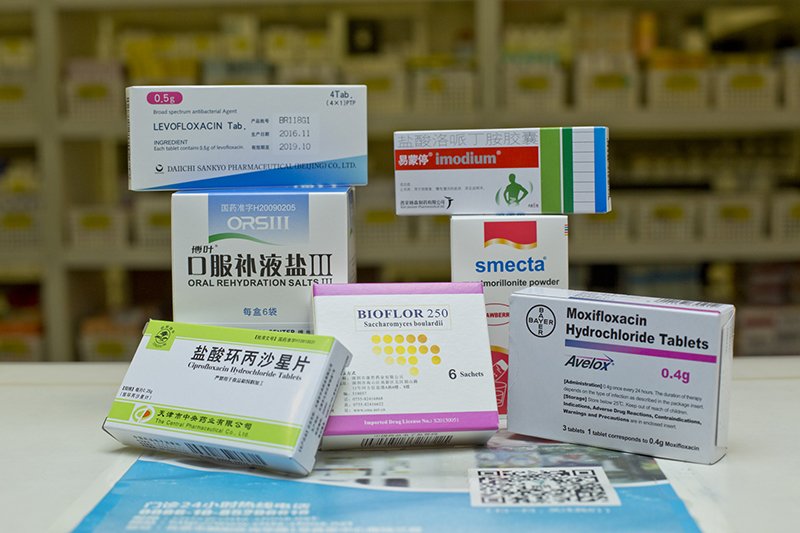Tips on How to Avoid Traveler’s Diarrhea on That Exotic Vacay
It has taken you a year to save up enough for that trip to that exotic country, and now you're finally there. It’s everything you dreamed of: vibrant colors, friendly people, and interesting culture. You are having a fabulous time until you decide to try some street food. Then things take a turn for the worst; your idyllic vacation ends up with you having an extended one-to-one with the John.
What you are suffering from is called traveler’s diarrhea and according to Vista Medical Center's Dr. Gary Sackrison, roughly 40 to 60 percent of people who travel will suffer from it at some point in their lives. “It is an infectious agent you pick up when you go to a different location,” he explains.

In addition to having diarrhea, people suffering from traveler’s diarrhea can experience cramping, fever, nausea, and even vomiting, although not in all cases.
According to Dr. Sackrison, most cases of traveler’s diarrhea are self-limiting, meaning that it will go away on its own. However, that doesn’t mean the individual should ignore the symptoms. He emphasizes that the first thing someone suffering from traveler’s diarrhea should do is hydrate because diarrhea takes a lot of fluids from the body and the body cannot function well without water.
“I always tell patients, ‘we can go a few weeks without eating but we are not going to go 48 hours without drinking,’ so fluids are what is most critical and that is what gets most people into trouble,” Dr. Sackrison says.

An American family doctor, Dr. Sackrison practiced medicine in the US for over 20 years before moving to China, working at Vista Medical Center for the past two years. So, how does someone know when they are dehydrated? Dr. Sackrison gave some pointers on what to look for when suffering from traveler’s diarrhea. In addition to dry mouth and no tears, he said that if an adult has gone more than 10 to 12 hours without urinating, he or she might be dehydrated. For children older than five, the time frame is eight to 10 hours without urinating and about six to eight hours for infants and children under five.
The doctor recommends adding rehydration salts to bottled water, which will replace both fluids and some of the minerals that are essential for the body to function optimally. Rehydration salt packets can be purchased in a pharmacy or the formula can be found on the internet. Also, some things to avoid when one has diarrhea: certain drinks such as coffee and alcoholic beverages, which are diuretics (they increase production of urine). The aim, he said, is to keep the body as hydrated as possible while you weather the illness.
If you do not see any improvement in your health after three days, you should see a medical doctor. Other “red flags” that require immediate medical attention are a high fever of at least 38 degrees Celsius, severe belly pain, and evidence of bleeding such as blood in the vomit or stool.
If nearly six in 10 travelers (60 percent) get traveler’s diarrhea while abroad, what steps can people take to prevent it?
Dr. Sackrison suggests first being vigilant about personal hygiene; always remember to wash your hands with soap before you eat. Another preventative measure is to be careful with where and what you eat.

“Avoid street food. Don’t eat food that has been previously cooked and is served at room temperature. Don’t eat fruits that you did not personally wash or peel,” Dr. Sackrison says. “So, if you are going to a restaurant, I would be a little bit nervous about ordering a salad or fruits that you personally have not seen washed because the probability that it was not handled well and could be contaminated is very high.”
He also cautions travelers against using tap water for things like ice or cold beverages.
“Avoid tap water. Ice made from tap water is a big one. Ice in restaurants is usually made from tap water. Even in the West, one of the greatest sources of problems is ice cubes from an ice machine, which are notoriously contaminated,” he said.
Unpasteurized dairy is another no-no. According to Dr. Sackrison, one of the most common causes of traveler’s diarrhea is bacteria found in unpasteurized dairy products. Also, for all the sushi eaters, he cautions restraint.
“I’d be very careful of raw and undercooked meat,” he states, adding that it is not uncommon for him to get patients who say, “I was out eating sushi last night, and it tasted great, but today I am sick.”
To prevent traveler’s diarrhea, Dr. Sackrison also recommends packing a few useful medications in tablet form for your trip, such as Pepto-Bismol, which can be taken as a preventative three times a day with every meal. Note that you should not take Pepto-Bismol if you are pregnant and it cannot be given to children under three years old. The doctor recommends a maximum continued use of no more than three weeks.


This is post is paid for by Vista Medical Center
Photos: Uni You, travelreadymd.com, ytimg.com







